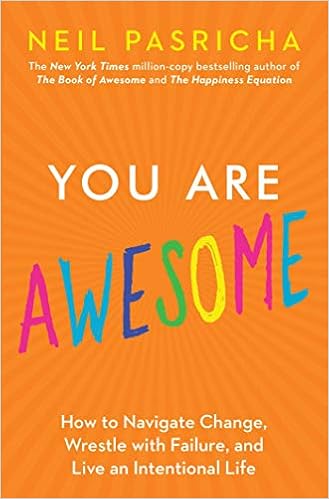Neil Pasricha: The Author of Awesome (Part 2: Chicken Soup For Kids, A Relationship Fail, and The Story You SHOULDN'T Ever Tell Yourself)
Hello again! Before I begin, I would like to thank Patreon for sponsoring this post! (crickets chirping) Just kidding, my blog isn't professional enough to actually have sponsors, but still, it's a platform that many internet influencers use to gain sponsorship from the public to make more projects. It's like GoFundMe FOR MARKETING!
Anyway, I may not actually have Patreon (Heck, I've never used Patreon for anyone!), but I do have a blog. And with the creative liberty and power of this blog, I am proud to present another episode of...
Anyway, I may not actually have Patreon (Heck, I've never used Patreon for anyone!), but I do have a blog. And with the creative liberty and power of this blog, I am proud to present another episode of...
Neil Pasricha: Author of Awesome!
 |
| "You Are Awesome" by Neil Pasricha |
Last time (if you haven't seen it, YOU NEED TO CATCH UP!): In Part 1, we covered the following.
- The three 'A's of Awesome: Attitude, Awareness, Authenticity
- How to change your negative thoughts to positive ones (Secret 1)
- Why you think of yourself as the centre of attention (Secret 2)
It's Part 2, yay! As I promised before, we will get into the next two secrets of "You Are Awesome": Secrets 3 and 4. Both these secrets have to do with taking the negative and shaping it into something positive. Indeed, I have believed in the philosophy of making something good out of something bad for a long time. As a kid, my parents would read me stories from Chicken Soup For The Kid's Soul. One of these stories was about a painter who was working on a mural and accidentally spilled paint on the dog's collar. They used the paint to write a little girl's initials, and that made the little girl happy. Since then, I had tried for long to make something good out of every little mistake. And maybe when I'm older, I can use this philosophy to positively embrace any failure that comes my way.
Without further ado, Secrets 3 and 4!
Secret 3: See It as a Step
In this section, Neil recounts his relationship with a girl who I will refer to as First Wife (because she actually was his first wife). A while after Neil and First Wife saw each other at a concert, they started dating. He learned plenty of things about her, like that she was an "old soul with old values", "a natural athlete", and that she "had wanted to be a teacher since she was ten years old". Neil also mentioned that after quitting P&G, he started a sandwich restaurant with his dad. He proposed to First Wife later on, and they got married the next July. Then, he went to Harvard, and once he graduated, he had strong feelings about finally starting a life with First Wife. However, they didn't talk to each other often. One day in summer, First Wife spit out the words Neil didn't want to hear: "I think we should get a divorce." Neil recalls, "Her words were full of compassion and empathy and heartache, but they still sent me reeling. I suddenly felt everything falling away." So what could he do with this heart-breaking moment? Add a dot-dot-dot, shift the spotlight, see it as a step. Life is an invisible staircase. Each step is a moment in life, but we don't know what the next one will be. All you have to do, in every failure, is recognize that this failure will lead you somewhere better. For example, Neil lived alone after his divorce, and was troubled by all the bad news out there; he couldn't find anything positive. Until he started his blog 1000awesomethings.com , and his positivity was at an all-time high, I guess. Despite all the troubles he had before, the blog was his way to keep going. He even met his now wife Leslie, and had three children, thanks to him moving.
Secret 4: Tell Yourself a Different Story
Let me just quickly sum up the story he starts this section with: Neil believed that all men had one thing, until he was in ninth grade, and found out they have two, which became shame for him. Just trying to keep it PG. Anyway, the morale of this story is that just because he had one didn't necessarily mean he wasn't good. The problem is the story you are telling yourself about the outside world. Another example from Neil's life is when his wife Leslie had a miscarriage. Instead of telling themselves that they were to blame, Neil and Leslie could just tell themselves that it was just a mistake, and it didn't matter much. In order to achieve this secret successfully, Neil recommends three big questions to ask yourself:
1. Will this matter on my deathbed?
2. Can I do something about this?
3. Is this a story I'm telling myself?
Next time on "Neil Pasricha: Author of Awesome": We move on to Secrets 5 and 6, all about long-time runs to accomplishment and confessing sins to healing.
Comments
Post a Comment